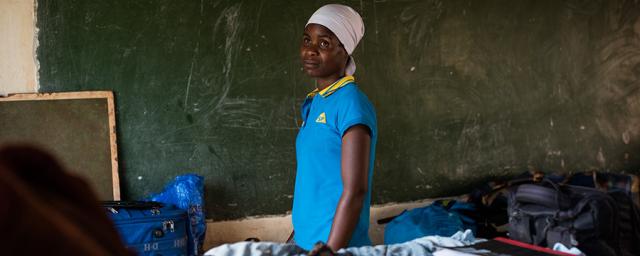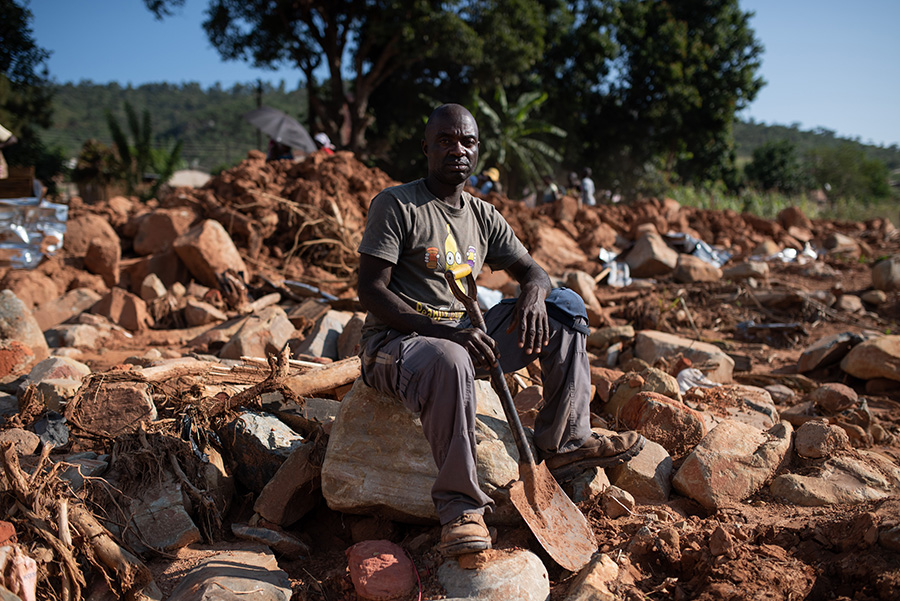
On March 14 and 15, Cyclone Idai tore through Southern Africa, leaving a trail of devastation in its wake. Winds of nearly 175 km per hour, widespread flooding and landslides destroyed roads and bridges, farmlands and crops, and damaged houses, some beyond repair.
In the worst-affected areas of Zimbabwe, Mozambique and Malawi, we’ve met survivors like Dorothy, Joshua and Madelema who have lost everything, their lives devastated by the cyclone. They are in urgent need of life-saving humanitarian assistance.
You can make a difference. Please, donate now to help us meet the most critical needs.
More than one month ago, Cyclone Idai devastated the lives of about 2 million people in Mozambique, Malawi and Zimbabwe. Survivors recall what happened when the cyclone hit the region, ravaging everything in its path, the terror they felt when floods swept away everything, homes and lives. When the water started entering their houses, most of them were sleeping at home.
As they focused on ensuring the safety of their children there was no time to rescue some of their belongings. Many families were separated in the chaos, their homes and possessions carried away with the flood waters.
“I spent three days in the water”
 Madelema is a single parent of two children. Her husband passed away some years ago, so she is the sole provider for her family. Madelema is from Buzi town, one of the areas that was badly impacted by Cyclone Idai. Her home was completely destroyed, and she is one of the many who do not know where others from her family are.
Madelema is a single parent of two children. Her husband passed away some years ago, so she is the sole provider for her family. Madelema is from Buzi town, one of the areas that was badly impacted by Cyclone Idai. Her home was completely destroyed, and she is one of the many who do not know where others from her family are.
“I have no family, no husband to look after us. We need a place to stay. I’ve got nothing now. There is nothing left”
When the cyclone struck, Madelema ran to safety on higher ground. When she thought the cyclone had passed she went back to see what she could save from her house. Then the flooding submerged the area, trapping them. They spent three days without any food until they were rescued by neighbors with a boat, and eventually made it to Guara Guara, where many survivors from Buzi district were seeking shelter and aid. (Photo: Micas Mondlane/Oxfam)
Separated families, lost children
 Joshua, 45, sits with a spade, after he has been digging in the rubble, searching for one of his children who was swept away when their house was taken in the landslide caused after Cyclone Idai, in Chimanimani, Zimbabwe. Photo: Philip Hatcher-Moore/Oxfam
Joshua, 45, sits with a spade, after he has been digging in the rubble, searching for one of his children who was swept away when their house was taken in the landslide caused after Cyclone Idai, in Chimanimani, Zimbabwe. Photo: Philip Hatcher-Moore/Oxfam
Joshua and his wife were sleeping with their two-year-old baby in one room, their three other children in another room, when the landslide tore through the town on the night of March 15. They ran out of the house with the baby but didn't manage to save their three other children. Two days later, they found two of their children, and have been looking for their third child ever since.
“We weren't warned that it would come here, just that it was in Mozambique.”
Joshua and some relatives are now staying in a nearby primary school, whilst his wife and baby have gone to stay with a relative in a nearby town. “We have no food, we are hungry,” he says. Chimanimani has been cut off with bridges and roads washed away, and the only relief has come by helicopters, as engineers open other routes to the devastated town.
“When I went back to the house, it crumbled and fell.”
 Dorothy is 27 years old. She’s a single mother and one of the worst hit members of the community in Phalombe district, Malawi. Following the flooding brought on by Cyclone Idai, Dorothy's house collapsed, the waters carrying away many of her belongings, all her food, as well as some of her livestock.
Dorothy is 27 years old. She’s a single mother and one of the worst hit members of the community in Phalombe district, Malawi. Following the flooding brought on by Cyclone Idai, Dorothy's house collapsed, the waters carrying away many of her belongings, all her food, as well as some of her livestock.
“When the water started entering the house, I took my daughter who was still asleep and went to a higher ground to escape the floods. When I went back to the house to begin rescuing some of my property, the house crumbled and fell. Luckily, I escaped.”
Dorothy is now trying to rebuild her house, but she lacks much of the materials she needs. She is also worried about the risk from water-borne diseases. She had to use her only mosquito net to tear up into pieces to act as string, to bind together the framework of her house. The food she was donated is almost finished. “From now onwards we don't know what to do.” she says. (Photo : Tavwana Chirwa/Oxfam)
“We thought we would die that day”
 Afonso Joao Felix, 25, and his cousin Joao Francisco Caitano, 29. Photo: Micas Mondlane/Oxfam
Afonso Joao Felix, 25, and his cousin Joao Francisco Caitano, 29. Photo: Micas Mondlane/Oxfam
Afonso’s house was completely destroyed in the cyclone. When the storm began, he ran to his mother’s house. “Cars were flying across the road. I thought the wind could have pulled everything off the house. Because I put the sand bags on the roof, the roof stayed on. We were scared. We thought we would die that day. Everything was coming down. We were all calling Jesus’ name.”
“We have nothing now. No jobs. My mother is on her own. I go back and check on her. She has nothing to eat there. So I have to go between.”
Afonso is now living with his wife and 6-year-old daughter in the transit centre in Guara Guara, in Mozambique, one of the areas that has been difficult to reach post Cyclone Idai as the road was impassable. He lost everything and still doesn't know where all his family are.
“I didn’t have anything for the baby.”
 Naomi, 21, with her son, Maliko*, sit under a mosquito net in an open-air camp in Nchalo trading centre, southern Malawi. Photo: Philip Hatcher-Moore/Oxfam
Naomi, 21, with her son, Maliko*, sit under a mosquito net in an open-air camp in Nchalo trading centre, southern Malawi. Photo: Philip Hatcher-Moore/Oxfam
Naomi, who was heavily pregnant with Maliko, fled her home when flooding caused by Cyclone Idai swept through her village. She made it to a nearby hospital with her mother-in-law, where she gave birth to Maliko, and then came to this camp.
“I felt like it was a huge misfortune that my first baby was born under such circumstances.”
“I didn’t have anything for the baby because everything was washed away.” Naomi says. “Well-wishers” in the local community have donated some things, including a bucket and some clothes with which to swaddle her son, but she needs clothes for Maliko, and nappies, and is worried he could get ill from sleeping out in the open.
*Name changed
Help us save lives
Despite huge access and logistical challenges, our teams are working around the clock to deliver water, food and sanitation services to those worst affected by Cyclone Idai. People’s lives are still in danger and we need to act now. Please donate what you can today.